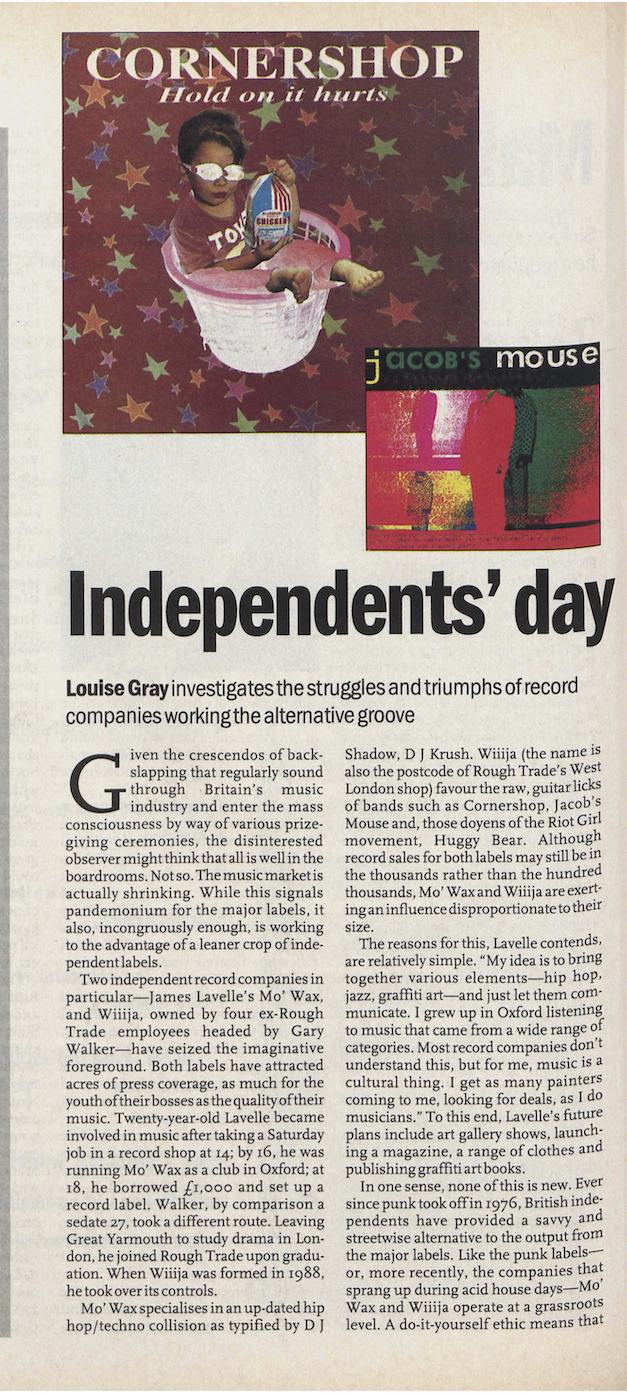New Statesman & Society
| Categories | Politics, geopolitics, books and culture and foreign affairs |
|---|---|
| Year founded | 1913 |
| First issue | 12 April 1913 |
| Country | England |
| Based in | London |
| Language | English |
| Website | www |
James Lavelle featured in a two page feature of the November 25 1994 issue of the magazine New Statesman & Society.
Transcript
Given the crescendos of backslapping that regularly sound through Britain's music industry and enter the mass consciousness by way of various prize giving ceremonies, the disinterested observer might think that all is well in the boardrooms. Not so. The music market is actually shrinking. While this signals pandemonium for the major labels, it also, incongruously enough, is working to the advantage of a leaner crop of independent labels.
Two independent record companies in particular--James Lavelle's Mo' Wax, and Wiiija, owned by four ex-Rough Trade employees headed by Gary Walker-have seized the imaginative foreground. Both labels have attracted acres of press coverage, as much for the youth of their bosses as the quality of their music. Twenty-year-old Lavelle became involved in music after taking a Saturday job in a record shop at 14; by 16, he was running Mo' Wax as a club in Oxford; at 18, he borrowed £1,000 and set up a record label. Walker, by comparison a sedate 27, took a different route. Leaving Great Yarmouth to study drama in London, he joined Rough Trade upon gradu. ation. When Wiiija was formed in 1988, he took over its controls.
Mo' Wax specialises in an up-dated hip hop/techno collision as typified by DJ Shadow, DJ Krush. Wiiija (the name is also the postcode of Rough Trade's West London shop) favour the raw, guitar licks of bands such as Cornershop, Jacob's Mouse and, those doyens of the Riot Girl movement, Huggy Bear. Although record sales for both labels may still be in the thousands rather than the hundred thousands, Mo' Wax and Wiiija are exerting an influence disproportionate to their size.
The reasons for this, Lavelle contends, are relatively simple. “My idea is to bring together various elements-hip hop, jazz, graffiti art—and just let them communicate. I grew up in Oxford listening to music that came from a wide range of categories. Most record companies don't understand this, but for me, music is a cultural thing. I get as many painters coming to me, looking for deals, as I do musicians." To this end, Lavelle's future plans include art gallery shows, launching a magazine, a range of clothes and publishing graffiti art books.
In one sense, none of this is new. Ever since punk took off in 1976, British independents have provided a savvy and streetwise alternative to the output from the major labels. Like the punk labels or, more recently, the companies that sprang up during acid house days-Mo' Wax and Wiiija operate at a grassroots level. A do-it-yourself ethic means that their overheads-a 12-inch record can costonly £1,000 to produce—are beguilingly low.
For their own part, the majors have retaliated with some subtle gamesmanship. By letting the independents do the ground work of developing new tastes and sounds, the majors are able to move in, offering label deals, financial support or just poaching bands. The latter is something Walker has experienced first hand. The impecunious Wiiija lost Silverfish to Creation Records (an independent which is now a wing of Sony) and, to A & M, Therapy?, the Belfast-based thrash metallers. Lavelle has just made a deal with Virgin Records that will allow him to continue Mo' Wax, while starting new independent and mainstream labels for them.
Such pressure to succumb, says Walker, can be immense. An independent that starts growing too quickly can easily find itself bogged down in administrative work, and its energies deflected. “When Wiiija got its first blast of blanket coverage with Huggy Bear, I started getting calls from lots of the majors. They all followed a pattern. They would start by detailing all the financial support they could offer and end by suggesting that I come and work for them. It turns out that they are interested notin Wiiija, butone's capacity as an A & R. Now, A & Rs (artist and repertory) are the people who sign bands, and at the major labels they come and go very quickly. There is a huge turnover. In these circumstances, it is unlikely that I would be allowed the time it needs to develop a band.”
The crucial issue for all independents, Walker stresses, is their capacity to surVive as something that is, forever, alternative. In this, Walker has been aided by an extraordinary spirit of cooperation that exists between his and like-minded labels such as Japan's Earth Noise, US-based Kill Rock Stars and the Beastie Boys' Grand Royal. Wiiija makes ends meet by several reciprocal licensing deals which allow them to market the product of foreign labels in Britain, who then sell Wiiija products abroad. The creation of such independent networks suggests not only a wish for autonomy, but a pronounced disaffection with the workings of the world's majors. It also suggests a new approach to economy. Making records, Walker believes, is not only about money. Contact with the real world, he says, is more important. Wiiija, which operates from Walker's basement flat in north London, has just released its most costly album yet: £6,500 work of Huggy Bears' Weaponry Listens To Love. He returns to the cultural themes of art interacting with community that infuse Lavelle's evangelical enthusiasm. The new underground, it seems, starts there.
Scans
-
Page 32
-
Page 33
